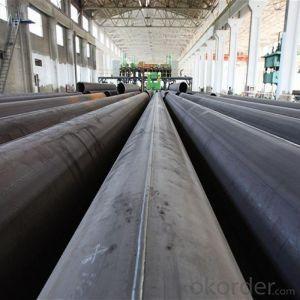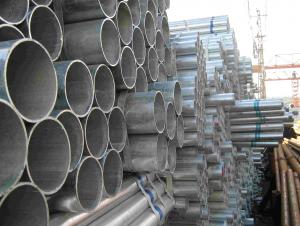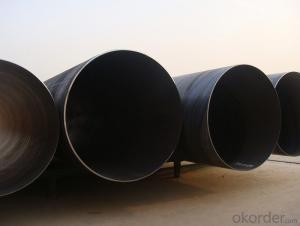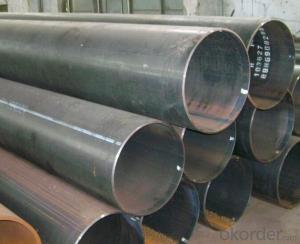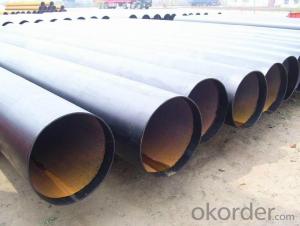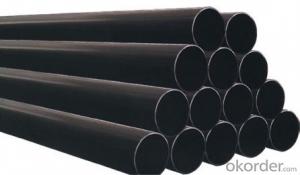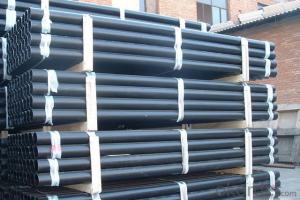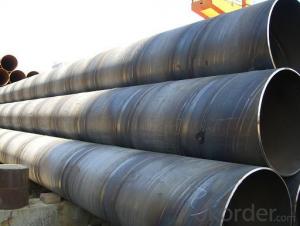LSAW SSAW CARBON STEEL PIPE ASTM A106 GR.B
- Loading Port:
- Tianjin
- Payment Terms:
- TT OR LC
- Min Order Qty:
- 1 m.t.
- Supply Capability:
- 3000 m.t./month
OKorder Service Pledge
OKorder Financial Service
You Might Also Like
Packaging & Delivery
Packaging Detail: | Normal exporting packing,in container or bulk vessel or as per clients' request |
Delivery Detail: | 2 months after confimed contract |
Specifications
Large Diameter API 5L X70 PSL2 LSAW Steel Pipe
Grade: X42, X46, X50, X52, X60, B, C
OD: 1.5"-28"
WT: SCH10-SCH160
Large Diameter API 5L X70 PSL2 LSAW Steel Pipe
Specifications:
u Standard: API 5L
u Grade: B, C, X42, X46, X50, X52, X56, X60, X65, X70, X80
u OD: 1.5"-28"
u WT: SCH10-SCH160
u Length: 5-12m
u Ends Finish: plain end, bevel end, grooved end
u Surface Treatment: bare, black varnished, oiled finish, red color, anti-corrosion, 3PE, FBE or epoxy coating
u Technique: hot rolled or cold drawn
u Application: api 5l steel pipe for conveying oil, water, gas
u Invoicing: based on theoretical weight or actual weight
u Payment Terms: L/C at sight, T/T or Western Union
u Trade Terms: FOB, CFR, CIF
u Certification: ABS manufacturing assessment, ABS design assessment, API 5CT, API 5L, DNV manufacturer certificate, ISO9001 quality management system certificate, ISO14001 environment management system certificate, GB/T28001 occupational health and safety management system certificate, A1 class manufacturing license of special equipment certificate, CCS, GL, LR, SGS, TüV, PDE
- Q: How are steel pipes used in the fabrication of storage tanks?
- Steel pipes are commonly used in the fabrication of storage tanks due to their strength, durability, and corrosion resistance. They are utilized in various ways, such as forming the structural framework of the tank, creating the walls and roof, and connecting different components together. Additionally, steel pipes can be welded or bolted to ensure a secure and leak-proof construction, making them an ideal choice for storage tank fabrication.
- Q: What are the common applications of steel pipes in the oil and gas industry?
- Steel pipes are commonly used in the oil and gas industry for various applications such as drilling, transportation of oil and gas, and pipeline construction. They provide strength, durability, and resistance to corrosion, making them suitable for carrying fluids under high pressure and in harsh environments. Steel pipes also facilitate efficient extraction, production, and distribution of oil and gas resources across vast distances.
- Q: Stainless steel tube, also known as why tube?
- Use can be divided into oil well pipe (casing, tubing and drill pipe etc.), line pipe, boiler tube, mechanical structure, hydraulic prop pipe pipe, cylinder pipe, geological pipe, chemical pipe (high pressure fertilizer pipe, oil cracking tube) and shipbuilding pipe etc.
- Q: Are steel pipes affected by magnetic fields?
- Indeed, magnetic fields can have an impact on steel pipes. Steel, being a ferromagnetic material, is strongly attracted to magnets and can be magnetized. When exposed to a magnetic field, steel pipes can become magnetized themselves, exhibiting magnetic behavior. This magnetic phenomenon can have several implications. Firstly, when steel pipes are in proximity to robust magnetic fields, like those generated by electrical currents or powerful magnets, they may experience a force that could cause them to move or vibrate. This can pose challenges in certain applications, particularly if the pipes need to remain stable and secure. Secondly, the presence of magnetic fields can induce electrical currents in steel pipes. These currents, known as eddy currents, can result in heat generation and energy losses. In some instances, this can lead to inefficiencies and increased energy consumption in systems involving steel pipes. Lastly, magnetic fields can also influence the accuracy of magnetic measurement devices utilized to identify defects or corrosion in steel pipes. The presence of a magnetic field can interfere with the readings, making it more difficult to precisely assess the condition of the pipes. To mitigate these effects, various measures can be implemented. For example, in applications where stability is of utmost importance, steel pipes can be shielded or isolated from strong magnetic fields using non-magnetic materials. Additionally, the impact of eddy currents can be minimized by employing pipes with proper insulation or by utilizing magnetic shielding techniques. In conclusion, while magnetic fields do affect steel pipes, the extent of the impact depends on factors such as the strength of the magnetic field, the composition of the steel, and the specific application or environment in which the pipes are utilized.
- Q: What are the different grades of steel pipes?
- The different grades of steel pipes vary based on their chemical composition and physical properties. Some commonly used grades include carbon steel pipes (grades A, B, and C), alloy steel pipes (grades P1, P5, P9, and P11), stainless steel pipes (grades 304, 316, and 321), and duplex steel pipes (grades 2205 and 2507). Each grade offers specific characteristics suited for different applications and industries.
- Q: Are steel pipes resistant to impact?
- Yes, steel pipes are generally resistant to impact due to their high strength and durability.
- Q: How are steel pipes protected from corrosion in corrosive environments?
- Steel pipes are protected from corrosion in corrosive environments through various methods such as applying protective coatings, using cathodic protection systems, and implementing corrosion inhibitors.
- Q: How are steel pipes used in structural applications?
- Steel pipes are commonly used in structural applications due to their strength, durability, and versatility. They are often used as columns, beams, and braces in buildings, bridges, and other structures. Steel pipes provide excellent load-bearing capacity and can withstand high levels of stress and pressure, making them ideal for supporting heavy loads. Additionally, their hollow cylindrical shape allows for easy installation and provides space for utilities such as electrical wiring or plumbing. Overall, steel pipes contribute to the stability and integrity of structures, ensuring their safety and longevity.
- Q: What is the typical diameter range of steel pipes?
- The diameter of steel pipes can vary depending on factors such as the intended use, industry standards, and project requirements. Generally, steel pipes come in a wide range of diameters to cater to different needs. Typical sizes can range from small diameters of approximately 0.5 inches (12.7 mm) to larger diameters of several feet or more. This wide range allows for various applications, including plumbing, oil and gas transportation, structural support, and industrial processes. Ultimately, the diameter of a steel pipe will be determined by the specific requirements of the project or application.
- Q: How are steel pipes connected to other materials like concrete or plastic?
- Various methods are commonly employed to connect steel pipes to other materials such as concrete or plastic. Among these methods, fittings play a significant role. Fittings, specialized components, serve to facilitate the connection between different materials or sections of pipe. These fittings are available in a variety of shapes and sizes, including elbows, tees, reducers, and couplings, and are designed to establish a dependable and leak-proof connection. When it comes to connecting steel pipes to concrete, one method involves the utilization of concrete anchors. These anchors are embedded within the concrete structure and provide a stable foundation for securing the steel pipe. Clamps or brackets are subsequently employed to attach the pipe to the anchor. In the case of joining steel pipes to plastic materials, the use of transition fittings proves to be effective. These fittings are specifically crafted to connect steel pipes with plastic pipes. They typically feature different connection mechanisms on each end, such as threads or compression fittings, enabling a secure and reliable joint. Welding techniques can also be employed to connect steel pipes to other materials in certain situations. Welding involves melting the ends of the steel and the other material together to create a robust joint. This method is commonly utilized for connecting steel pipes to steel structures or components. In summary, the connection of steel pipes to materials like concrete or plastic necessitates the utilization of specialized fittings, anchors, or welding techniques. These methods guarantee a secure, long-lasting connection capable of withstanding the demands of the given application.
Send your message to us
LSAW SSAW CARBON STEEL PIPE ASTM A106 GR.B
- Loading Port:
- Tianjin
- Payment Terms:
- TT OR LC
- Min Order Qty:
- 1 m.t.
- Supply Capability:
- 3000 m.t./month
OKorder Service Pledge
OKorder Financial Service
Similar products
Hot products
Hot Searches
Related keywords
